专业英语精读Unit 1 Book 3 (第三版)
外教社大学英语精读第三册unit1原文+翻译+课后翻译
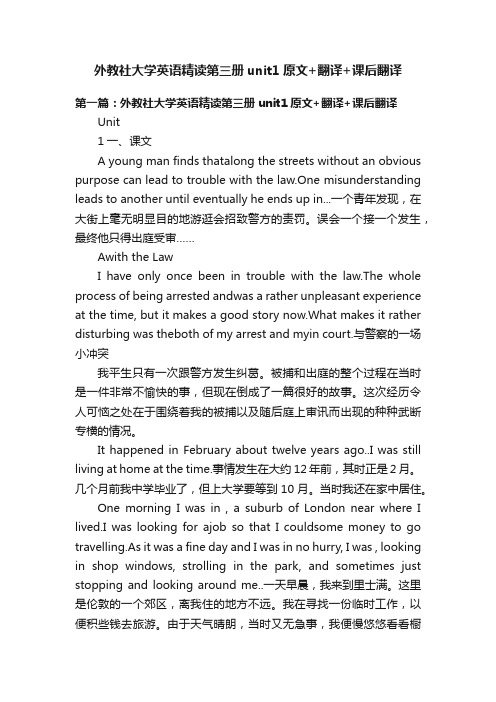
外教社大学英语精读第三册unit1原文+翻译+课后翻译第一篇:外教社大学英语精读第三册unit1原文+翻译+课后翻译Unit1一、课文A young man finds thatalong the streets without an obvious purpose can lead to trouble with the law.One misunderstanding leads to another until eventually he ends up in...一个青年发现,在大街上毫无明显目的地游逛会招致警方的责罚。
误会一个接一个发生,最终他只得出庭受审……Awith the LawI have only once been in trouble with the law.The whole process of being arrested andwas a rather unpleasant experience at the time, but it makes a good story now.What makes it rather disturbing was theboth of my arrest and myin court.与警察的一场小冲突我平生只有一次跟警方发生纠葛。
被捕和出庭的整个过程在当时是一件非常不愉快的事,但现在倒成了一篇很好的故事。
这次经历令人可恼之处在于围绕着我的被捕以及随后庭上审讯而出现的种种武断专横的情况。
It happened in February about twelve years ago..I was still living at home at the time.事情发生在大约12年前,其时正是2月。
几个月前我中学毕业了,但上大学要等到10月。
当时我还在家中居住。
One morning I was in , a suburb of London near where I lived.I was looking for ajob so that I couldsome money to go travelling.As it was a fine day and I was in no hurry, I was , looking in shop windows, strolling in the park, and sometimes just stopping and looking around me..一天早晨,我来到里士满。
专业英语精读Unit 3 Book3 (第三版)

Unit3Text II.Writing Skills1)The text is a piece of narrative writing and organized in the usual chronological order.But atthe start of the text,the author used the flashback technique by beginning with the signing of the will and then turned back to the classification of Shakespeare’s life into several periods based on a time order.The author also used the“cyclic return”in the writing by using the key word“signature”both in the first paragraph and the last paragraph.The two techniques helped the author to inform the reader about the life of Shakespeare most effectively.2)The author used many adjectives ending with“–ing”,superlatives and some emphaticsentence patterns to achieve an“emotional”tone,trying to arouse the strong feelings in readers.nguage Points1.The way to express datee.g.in May;in1999;in June,1998;on August3rd,19982.number-year/month-old+n.e.g.He has a two-month-old baby.He offered his seat to a sixty-five-year-old woman.cf:They had a ten-minute talk.No decision was made after a two-hour meeting.3.will,legacy,inheritance,estatewill:a legal statement about how to deal with the property after deathlegacy:money or other belongings left to another person after deathinheritance:receiving property,title from ancestors according to the willestate:Estate includes real estate and personal estate.real estate(动产):land and buildingpersonal estate(不动产):money,property4.the second/third/by far+the superlative degree of an adjectivee.g.Hainan Island is the second largest island in China.Paraphrase:She is one of the most diligent girls in our class and considered to be No.3.The Amazon is the longest river in the world.(use“by far”)This book is the most interesting one of all the books.(use“by far”)5.adv+off=richcomfortably off,well off,well to dobe better off=be in better circumstancesbe worse off=be in worse circumstances6.amount to①add up to,reache.g.Our monthly expenditure on food usually~s to150yuan.②be equal in meaning,be the same ase.g.Failure to prepare a lesson well before class on the part of the teacher~s tonegligence of duty;whereas failure to attend the class on time on the part of thestudent~s to a breach of discipline.7.there is no…not…double negation for emphasise.g.No one who was treated by Dr Wang was not deeply moved by his conscientious work. Use“No one…not”to paraphrase the following:Everyone who has been to Beijing is impressed by the magnificence and grandeur of the Great Wall.Everyone who saw the house designed by him was interested in its structure.Everyone who heard the report was touched by his deeds.8.awe①awe(n.):a mixed feeling of fear and feare.g.He has a feeling of~when standing in front of his father.I read his novel with~.The lazy boy stood in~of his stern teacher.awe-inspiring:fill with awe,make people show more respect to sb.e.g.He is an awe-inspiring writer/manager.awe-stricken/struck:struck with awee.g.He was awe-struck when he saw his father.②awe(v.):fill with awee.g.The sight~d them.I was~d by his words.~sb.into+n./doing sth.e.g.He~d the children into obedience.They were~d into silence.The boss~d the workers into working overtime.③adj.A.awesome:causing awee.g.His works are~to some readers.B.awful:dreadful,very bada)(showing one’s feeling)e.g.He died an~death.I feel~.b)(describing the characteristics of an object)e.g.Everything is in an~mess.The pain is~.④awfully(adv.):verye.g.You look~well today.He is~worried about his son.9.in spite of,althoughin spite of+n.;although+sentencee.g.Although he is old,he is still studying English.In spite of his old age,he is still studying English.Use“although”and“in spite of”to paraphrase the followingIt’s very cold outside,but the boys are playing happily.It’s very expensive,but I buy one as a souvenir.The mountain is really very tall,but we managed to reach the top.10.rather than:instead ofe.g.Young people should be an asset(财产)to society~a menace or a curse.Paraphrase:It was such a low doorway that I had to bend my head to go into the room instead of walking into the room upright.He died instead of surrendering.11.have difficulty in+V-ing/with+n.e.g.He has difficulty in learning English.I don’t have any difficulty with my math.12.plot①v.---make secret plans设计(谋),密谋~to do sth.e.g.The two thieves were plotting with another two to rob the bank.Paraphrase:They are making secret plans to climb over the wall to poison the dog.~+n.e.g.They are plotting a coup d’etats(or:coups d’etat政变)in the garden.~againstParaphrase:The guerrillas were trying to overthrow the government.②n.a)make/form a plot(=a secret plan)e.g.They are making a~to overthrow their government.Two men formed a~to burn the barn(to rob the bank)b)design the plot of a story(=outline)e.g.This play has a very complicated~.c)a piece of lande.g.There is a vegetable~behind his house.13.involve①involve(v.):cause sb.to become connected or concerned牵涉,拖累e.g.This case~s all of us.Don’t~me in your quarrel.be/get/become~d in卷进e.g.I got~d in the quarrel between Mary and Jones.David was~d in the robbery.~(oneself)with与…混在一起e.g.Don’t~yourself with that sort of people.He~s himself with criminals.②involved(adj.):complicated,difficult to understande.g.He told me an~story about his large family.The letter was very~.③involvement(n.)e.g.He can’t get rid of the~in the murder.脱不了干系,洗脱不了嫌疑14.puzzle①puzzle(v.):causing difficulty to understande.g.His illness~d the doctor.The boy’s recent behavior~d me.~about:make a great effort of mind in order to find an answer to the questione.g.I’ve been puzzling about the question.Paraphrase:He was trying to find out the ways to settle the problem.~out(绞尽脑汁地)想出e.g.He spent the whole afternoon,trying to~out the answer.be~d aboute.g.I’m~d about what he said.Many people are~d about his life.②n.A.puzzlement:the state of being puzzlede.g.He is in~.The girl looked at me in~.B.puzzlea)sth.that one can’t understand or explain难解之事e.g.No one has succeeded in explaining the~of how life began.Paraphrase:The detectives still can’t explain the murder case.b)be in a puzzle:be at a losse.g.I’m in a~as to what to do next.c)字谜e.g.A famous Chinese~has seven pieces.七巧板a cross-word~填字游戏a jigsaw~拼图游戏15.conviction:very firm and sincere beliefe.g.He speaks in the full~that he is right.(深信)It is my~that we can have the four modernizations realized in not so long a time.Paraphrase:He said with a firm belief that he saw it with his own eyes.16.talk…into…:persuade sb.to do sth.17.trace①trace(v.)a)follow or discover sb.or sth.by observing some marks,traces or little evidencee.g.They could not~(=find)him.Paraphrase:I can’t find the document you refer to.They walked along the river until they came to the sea.(trace…down….)We tried to find out the origin of this story.追踪寻源(trace…to…)b)try to finde.g.The post office is~ing the missing parcel.c)mark标出e.g.Please~the location of London on the map.d)描图e.g.Trace the map by putting the thin paper over it.trace back toe.g.His family can~its history back to the10th century.This system of the government can be~d back to the ancient Romans.The rumor was~d back to a journalist.②trace(n.)a)marks,signse.g.We’ve lost all~s of the criminal.Paraphrase:The wolf left its marks on the snow.He has disappeared without any signs..The policemen found signs of struggle in the room.有搏斗的痕迹b)a bite.g.There was a~of jealousy in her voice.Paraphrase:It rained a bit(=a little)yesterday.③traceable(adj.)e.g.The mistake is~to carelessness.18.the lost years:seven years from1585to1592,the time when Shakespeare was supposed to betraveling abroad by sea19.influence①influence(v.):have an effect on sth./sb.e.g.Advertisements~people’s life a lot.The weather~s the growth of crops.cf:affect:focus on the resultinfluence:focus on the action itselfe.g.Too much drink may affect your health.(The result of too much drink might spoilyour health.)We’re deeply affected(=moved)by his speech.②influence(n.)have~over/on sth./sb.have a(n)+adj.+influence on/over sth./sb.e.g.A teacher can have a great~over his students.Religion has a great~on people’s behavior.exert an~one.g.The moon exerts an~on the tides.潮汐The climate exerts an~on vegetables.③influential(adj.)e.g.He was an~writer in China.His father is an~man in our city.III.Questions on Text I(Book3,Unit3)1.What is Shakespeare’s will about and when did he sign his will?2.What do you think of Shakespeare’s financial condition?Why?3.According to the author,what is the most important thing to historians?4.How did people in the world like Shakespeare’s novels?Why?5.Why did the author say that Shakespeare lived only yesterday?6.What has Shakespeare’s fame brought to his birthplace?7.Is there any difference between English in Shakespeare’s time and present-day English?8.Why did the author say that writing about his life is just like writing detective stories?9.There is no record about his whereabouts from1589to1592,where was he in those seven years probably?10.Was he suffering from toothache at sea?11.When did he begin to be interested in drama and how?12.What can be considered as the evidence indicating the beginning of Shakespeare’s literarycareer?13.As a dramatist,what else did Shakespeare do in addition to working on play?14.Why are there so many mysteries about Shakespeare?Is it possible to solve them?15.Can you tell me anything else you know about Shakespeare?IV.Translation1.老王为什么要辞职使他的好多同事感到迷惑。
大学英语精读第三版第一册课后习题全部答案
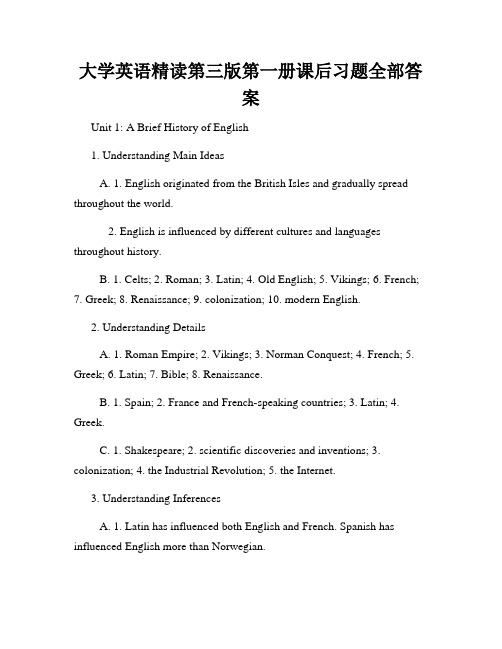
大学英语精读第三版第一册课后习题全部答案Unit 1: A Brief History of English1. Understanding Main IdeasA. 1. English originated from the British Isles and gradually spread throughout the world.2. English is influenced by different cultures and languages throughout history.B. 1. Celts; 2. Roman; 3. Latin; 4. Old English; 5. Vikings; 6. French;7. Greek; 8. Renaissance; 9. colonization; 10. modern English.2. Understanding DetailsA. 1. Roman Empire; 2. Vikings; 3. Norman Conquest; 4. French; 5. Greek; 6. Latin; 7. Bible; 8. Renaissance.B. 1. Spain; 2. France and French-speaking countries; 3. Latin; 4. Greek.C. 1. Shakespeare; 2. scientific discoveries and inventions; 3. colonization; 4. the Industrial Revolution; 5. the Internet.3. Understanding InferencesA. 1. Latin has influenced both English and French. Spanish has influenced English more than Norwegian.B. 1. The French-speaking Normans ruled England after the Norman Conquest. French vocabulary entered English as a result.C. 1. The colonization of America and the spread of the British Empire promoted the use of English worldwide.4. Understanding VocabularyA. 1. E; 2. E; 3. C; 4. D; 5. B; 6. C; 7. A; 8. E; 9. B; 10. D; 11. C; 12. A;13. A; 14. C; 15. D; 16. B.B. 1. evolution; 2. consolidation; 3. influx; 4. prosperity; 5. dominance;6. expansion;7. fluctuations;8. prevalence.Unit 2: Cultural Differences and Cultural Shock1. Understanding Main IdeasA. 1. Cultural differences can lead to misunderstandings and conflicts.2. Cultural shock is a common experience for people in a new cultural environment.B. 1. cultural differences; 2. culture shock.2. Understanding DetailsA. 1. The way people greet each other; 2. Personal space; 3. Eye contact; 4. Time orientation.B. 1. etiquette; 2. gestures; 3. customs; 4. lifestyles; 5. values.3. Understanding InferencesA. 1. Expectations and behaviors vary across different cultures.B. 1. It is essential to understand and adapt to a new culture to avoid misunderstandings and conflicts.4. Understanding VocabularyA. 1. C; 2. A; 3. E; 4. C; 5. D; 6. B; 7. E; 8.B.B. 1. perception; 2. encounter; 3. adapt; 4. reverse; 5. undergo.Unit 3: The Beginnings of Isolation1. Understanding Main IdeasA. 1. The narrator's solitude on the island gives him a sense of freedom and empowerment.2. The narrator is concerned about the presence of "wild things" on the island.B. 1. solitude; 2. wild things.2. Understanding DetailsA. 1. The narrator occupies himself with building, exploring, and observing nature on the island.B. 1. The narrator feels like the "king" of the island and enjoys the freedom it brings.2. The narrator is cautious about the "wild things" and their potential threat to him.3. Understanding InferencesA. 1. The narrator's newfound solitude allows him to escape the restrictions and expectations of society.B. 1. The narrator's isolation might lead to psychological challenges and fear.4. Understanding VocabularyA. 1. A; 2. D; 3. B; 4. E; 5. C; 6. D; 7. A; 8.B.B. 1. solitude; 2. companionship; 3. survival; 4. vulnerability.。
大学英语精读第三版第一册Book1Unit3答案

大学英语精读第三版(上海外语教育出版社董亚芬主编)第一册Book1 Unit3答案1) present2) decade3) content4) arrange5) minor6) efficient7) endure8) extra9) reluctantly10) tremble1) bunch2) packet/pack3) piece4) pair5) piece6) bunch7) pair8) piece9) bunch10) packet11) pair12) piece1) at other times2) After all3) efficient4) endure5) extra extra6) round the corner7) occasions8) minor9) arranged10) primary11) rare12) trembling13) reluctantly14) disappointment1) can endure2) on the occasion of3) to pick it up4) are not sure of5) felt a pang of disappointment6) Not being content1) milkman2) fireman3) fisherman4) businessman6) spaceman7) weatherman8) sportsman1) broadens2) widened3) quicken4) darkened5) sharpening6) shortens1) excitement2) excited3) exciting4) excitedly5) excited6) excited1) disappointed2) disappointing3) disappointed4) disappointment5) disappointed1) patience2) patient3) patiently1) reluctant2) reluctance3) reluctantly4) reluctant1) efficiency2) efficient3) efficiently4) efficient1) contents2) content3) content/contented4) content5) contented6) content7) contents8) content1) The bottle is too small to hold so much water.2) He was too tired to go any further.3) He is too proud to see his own shortcomings.4) It is too late for the bookstore to be open.5) They did not stop working until it became completely dark.6) He did not come until the meeting was over.7) He said he would not get married until he had found a satisfactory job.8) He did not go to bed until he had finished his reading assignment.1) occasion2) endured3) rare4) postman5) trembled6) After all7) at other times8) disappointmentA1) necessary2) and3) with4) The5) of6) in7) growing8) if9) one10) through11) when12) continueB1) present2) any/those3) could4) sing5) sent6) cost7) birthday8) bird9) replied1) journey2) shocked3) funeral4) While there5) conversations6) thoughts7) provide8) dozens9) over and over10) meant翻译1) 那位名演员似乎很乐意在剧中扮演一个次要角色。
大学英语精读第三版1-3课
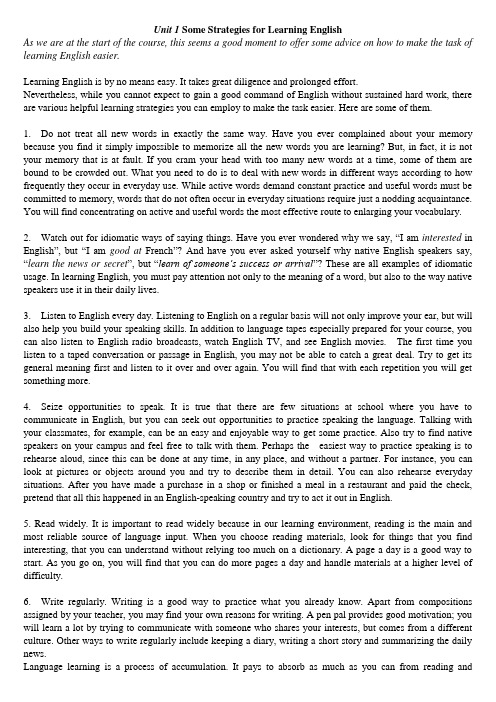
Unit 1 Some Strategies for Learning EnglishAs we are at the start of the course, this seems a good moment to offer some advice on how to make the task of learning English easier.Learning English is by no means easy. It takes great diligence and prolonged effort.Nevertheless, while you cannot expect to gain a good command of English without sustained hard work, there are various helpful learning strategies you can employ to make the task easier. Here are some of them.1. Do not treat all new words in exactly the same way. Have you ever complained about your memory because you find it simply impossible to memorize all the new words you are learning? But, in fact, it is not your memory that is at fault. If you cram your head with too many new words a t a time, some of them are bound to be crowded out. What you need to do is to deal with new words in different ways according to how frequently they occur in everyday use. While active words demand constant practice and useful words must be committed to memory, words that do not often occur in everyday situations require just a nodding acquaintance. You will find concentrating on active and useful words the most effective route to enlarging your vocabulary.2. Watch out for idiomatic ways of saying things. Have you ever wondered why we say, “I am interested in English”, but “I am good at French”? And have you ever asked yourself why native English speakers say, “learn the news or secret”, but “learn of someone’s success or arrival”? These are all exampl es of idiomatic usage. In learning English, you must pay attention not only to the meaning of a word, but also to the way native speakers use it in their daily lives.3. Listen to English every day. Listening to English on a regular basis will not only improve your ear, but will also help you build your speaking skills. In addition to language tapes especially prepared for your course, you can also listen to English radio broadcasts, watch English TV, and see English movies. The first time you listen to a taped conversation or passage in English, you may not be able to catch a great deal. Try to get its general meaning first and listen to it over and over again. You will find that with each repetition you will get something more.4. Seize opportunities to speak. It is true that there are few situations at school where you have to communicate in English, but you can seek out opportunities to practice speaking the language. Talking with your classmates, for example, can be an easy and enjoyable way to get some practice. Also try to find native speakers on your campus and feel free to talk with them. Perhaps the easiest way to practice speaking is to rehearse aloud, since this can be done at any time, in any place, and without a partner. For instance, you can look at pictures or objects around you and try to describe them in detail. You can also rehearse everyday situations. After you have made a purchase in a shop or finished a meal in a restaurant and paid the check, pretend that all this happened in an English-speaking country and try to act it out in English.5. Read widely. It is important to read widely because in our learning environment, reading is the main and most reliable source of language input. When you choose reading materials, look for things that you find interesting, that you can understand without relying too much on a dictionary. A page a day is a good way to start. As you go on, you will find that you can do more pages a day and handle materials at a higher level of difficulty.6. Write regularly. Writing is a good way to practice what you already know. Apart from compositions assigned by your teacher, you may find your own reasons for writing. A pen pal provides good motivation; you will learn a lot by trying to communicate with someone who shares your interests, but comes from a different culture. Other ways to write regularly include keeping a diary, writing a short story and summarizing the daily news.Language learning is a process of accumulation. It pays to absorb as much as you can from reading andlistening and then try to put what you have learned into practice through speaking and writing.New Words(1) strategy n. -- 战略学,兵法I admired the general who was a master of strategy. 我敬佩那位精通兵法的将军。
现代大学英语 精读3(第三版)教学课件B3U1.pptx
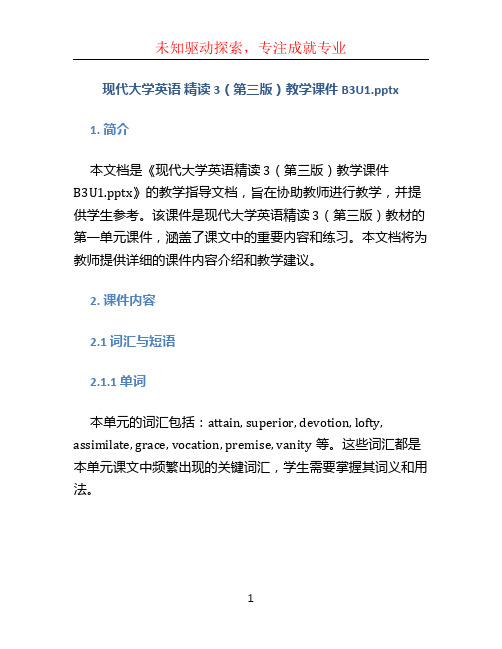
现代大学英语精读3(第三版)教学课件B3U1.pptx1. 简介本文档是《现代大学英语精读3(第三版)教学课件B3U1.pptx》的教学指导文档,旨在协助教师进行教学,并提供学生参考。
该课件是现代大学英语精读3(第三版)教材的第一单元课件,涵盖了课文中的重要内容和练习。
本文档将为教师提供详细的课件内容介绍和教学建议。
2. 课件内容2.1 词汇与短语2.1.1 单词本单元的词汇包括:attain, superior, devotion, lofty, assimilate, grace, vocation, premise, vanity等。
这些词汇都是本单元课文中频繁出现的关键词汇,学生需要掌握其词义和用法。
2.1.2 短语本单元的短语包括:be indicative of, bring out, take…seriously, measure up to, in good part等。
教师可以通过例句和实例来帮助学生理解这些短语的含义和用法。
2.2 阅读理解本单元的阅读理解部分涵盖了三篇文章,分别是《选择正确的途径》、《智慧的力量》和《忠诚的战士》。
教师可以通过课件中的题目和文字说明帮助学生理解文章内容,并进行讨论和解答相关问题。
2.3 语法与写作本单元的语法重点是介词和非谓语动词的用法。
教师可以利用课件中的例句和练习来讲解和巩固学生对这些语法知识的掌握。
此外,课件还包括写作部分,教师可以引导学生根据所学的语法知识写作相关的练习作文。
3. 教学建议3.1 教学方法教师可以采用多种教学方法来教授本单元内容,如讲解法、示范法和讨论法等。
在讲解词汇和短语时,可以先通过示范法来引导学生正确使用,然后进行讨论和实践。
在阅读理解部分,可以采用讨论法来引导学生分析文章内容,并提出自己的见解和观点。
在语法与写作部分,可以通过讲解法和实践法相结合,引导学生掌握语法知识,并培养写作能力。
3.2 学生活动教师应鼓励学生积极参与课堂活动,并提供一些学生活动的建议,如词汇卡片制作和交流、小组讨论、写作练习等。
大学英语精读第三版第一册Book1Unit1-3答案

大学英语精读第三版第一册Book1Unit1-3答案大学英语精读第三版第一册Book1 Unit1答案1)e2)g3)j4)a5)b6)i7)c8)d9)h10)f1) handling2) summarized3) process4) absorb5) are bound to6) feel free7) for instance8) strategies9) complained10) has committed to memory11) Nevertheless12) rely on13) Apart from14) command1) over and over again2) at a time3) put it into practice4) watching out for5) by no means6) concentrate on7) In addition t8) in detail1)action2)employ3)announce4)examination5)communication6)express7)compose8)improvement9)concentration10)management11)consider12)motivate13)development14)movement15)discuss16)operate17)division18)production19)educate20)repeat1) additional2) add3) addition4) addition1) effectively2) effect3) effective4) effect1) helpful2) help3) helpless4) help5) helplessly6) helpfully7) helpful1) reliant2) reliable3) reliance reliable4) relies5) reliably6)1) repetition2) repeating3) repeatedly4) repeated5) repetition1) In my opinion2) According to Mary3) In our opinion4) According to today's papers5) In most doctors' opinion According to most doctors1) Shakespeare was not only a dramatist but also an actor.2) Miss Crain not only took me home in her car, but also came the next day to see if I had recovered.3) Hainan Island attracts tourists not only in winter but alsoin summer.4) There is always a black market not only in Britain, but also in other European countries.5) At the Athens Olympics in 2004, Liu Xiang not only won a gold medal in the 110-meter hurdles, but also broke the Olympic record.1) It is true that your sentences are all grammatically correct, but they don’t make any sense.2) It is true that they lost that battle, but they still went on fighting.3) It is true that T om’s very clever and hardworking, but I stilldon’t think he is the right person for the job.4) It is true that learning English is by no means easy, but we can make the task easier by using some learning strategies.1) strategies2) frequently3) over and over again4) commit to memory5) acquaintance6) watch out for7) communicate8) process9) opportunities10) rely on11) put into practice12) absorbed1) if2) about3) it4) know5) up6) as7) addition8) even9) into10) other11) for12) while1) memorize2) a matter of3) taught4) shelf5) realize6) written7) idiomatic8) join in9) difference10) gain a good command翻译1) 史密斯太太对我抱怨说,她经常发现与自己十六岁的女儿简直无法沟通。
现代大学英语精读3 Unit 1 课文 翻译及课文知识重点

精心整理 Book3Unit1使某人突然意识到1.ItoccurstosbthatItstrikestosbthatItoccursonsbthatItoccurstosbtodosth破晓;(逐渐被人)明白2.dawnon认同危机3.identitycrisis经历4.gothrough5.chanceevent偶然事件轮流;反过来6.inturn独立于7.beindependentfrom依赖于8.bedependenton分开9.separationfrom患得患失10.fearloss把……定义为definesthas11.免于……不受……约束befreedomfrom12.往后站;处在离……较远的地方;不介入standback13.情绪低落14.feellowerorhigher……than……否定+比较级=最高级15.nothingbounceinto 突然闯进;蹦进;胁迫sb做16.爱上sb17.havearomanticrelationshipwith18.无精打采的走’sfeetdragonerelateto有良好关系19.cometorealize逐渐意识到20.为sb做榜样modelfor=makeanexampleforsb21.反抗rebelagainst22.对……有偏见beprejudicedagainst23.beequalto相同;等同24.inadditionto除了25.任命;委派appointtoposition26.inadifferentlight=inadifferentway以另一种不同的观点来看27.forcertain确定地,肯定地28.促成contributeto29.观察30.observev.观察力observationn.善于观察的observantn.触摸;控制;处理handlev.31.applyv.申请;应用;适用于;敷,涂32.需要,包括,影响,involvev.33.牵涉;包含involvesborsthinvolvedoingsth包含把sb卷入sthinvolvesbinsth被卷入beinvolvedinsthinvolveda.复杂的牵扯;财政困难 involvementn.边境问题borderissuen.34.解决争端settledispute35.传输气体transportgasfromsth 36.处理;照顾seetoit37.危险期criticalcondition 38.搁置;不考虑leaveitaside39.未能/忘记带… leavesb/sthbehind停止leaveoff不再穿某物leavesth.off忽略;不提及leaveitout推迟某事leavesthover40.调查lookat=lookinto仰视;改善lookup查阅(字典,参考书中) looksthup看望或接触sblooksbup计划未来lookahead瞧不起lookdownupon…as把……视为lookupon开始精力充沛的做sth41.setto开始做sth setaboutdoingsetouttodo开始做sth陈述sthsetoutsthsentout派遣42.becontentwith知足的43.摆脱befreefrom44.interactwith与……相互作用45.Translation1.她打算申请那个学术工作。
Unit 1 Book 3 (第三版)英语精读grammar
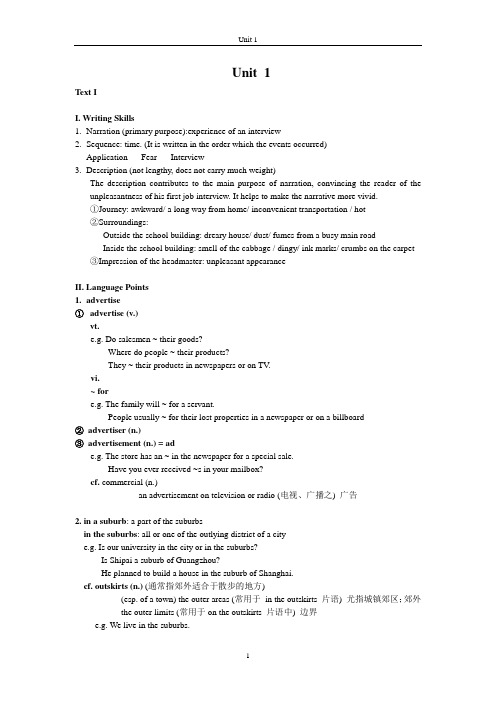
Unit 1Text II. Writing Skills1.Narration (primary purpose):experience of an interview2.Sequence: time. (It is written in the order which the events occurred)Application ----Fear ----Interview3.Description (not lengthy, does not carry much weight)The description contributes to the main purpose of narration, convincing the reader of the unpleasantness of his first job interview. It helps to make the narrative more vivid.①Journey: awkward/ a long way from home/ inconvenient transportation / hot②Surroundings:Outside the school building: dreary house/ dust/ fumes from a busy main roadInside the school building: smell of the cabbage / dingy/ ink marks/ crumbs on the carpet③Impression of the headmaster: unpleasant appearanceII. Language Points1.advertise①advertise (v.)vt.e.g. Do salesmen ~ their goods?Where do people ~ their products?They ~ their products in newspapers or on TV.vi.~ fore.g. The family will ~ for a servant.People usually ~ for their lost properties in a newspaper or on a billboard②advertiser (n.)③advertisement (n.) = ade.g. The store has an ~ in the newspaper for a special sale.Have you ever received ~s in your mailbox?cf. commercial (n.)---an advertisement on television or radio (电视、广播之) 广告2. in a suburb: a part of the suburbsin the suburbs: all or one of the outlying district of a citye.g. Is our university in the city or in the suburbs?Is Shipai a suburb of Guangzhou?He planned to build a house in the suburb of Shanghai.cf. outskirts (n.) (通常指郊外适合于散步的地方)---(esp. of a town) the outer areas (常用于in the outskirts 片语) 尤指城镇郊区;郊外---the outer limits (常用于on the outskirts 片语中) 边界e.g. We live in the suburbs.The children have been out for the day to some green spot on the outskirts.3. be short of: have not enough; lack ;be in need ofbe short on: be poorer at, be not so good at 在…稍差,在…较欠缺e.g. The book has good information, but rather short on illustration.She is a nice person, but short on looks.4.apply①apply (v.)a) request~ to sb. for sth.e.g. If you want to go abroad, you may ~ to the Consul for a visa.He has applied to the banker for a loan.I will ~ to the boss for the position in person, not by letter.b)put into use or into position to serve its purpose 应用~ sth. to sth.e.g. He applies a sticking plaster to the cut.Do you ~ your knowledge to the practice?The teacher will ~ the rule to every student.~ oneself / one’s energy/ one’s mind to sth./ doing sth.---concentrate one’s thoughts on a taske.g. We must ~ ourselves to our study.Paraphrase:He concentrates himself on learning French .If you try your best to do the job, you will soon finish it.②applicant (n.)③application (n.)make an ~ to sb. for sth.e.g. We made an ~ to the court for inquiry.The manager has received 20 ~s for the position.5.degree①rank or grade given by a university to one who has passed an exame.g. Bachelor of Arts / Science (BA/ BS)Master of Arts /Science (MA/ MS)Doctor of Philosophy (PH.D) 哲学博士Doctor of Science / Medicine / Law②to/ in …degree 等级,程度e.g.. To what degree can he be trusted?He cannot be trusted in the slightest degree.6. land①go, come, put on land; bring to lande.g. The plane ~ed safely.The pilot ~ed the airliner.②bring to reach a positione.g. He ~ed himself in great difficulties.③get (informal)e.g. If I manage to ~ the job, I will stand you all a free drink.He ~ed a valuable prize.7. chances of: (often plural with singular meaning) possibility; likelihood thatsth. will happene.g. You would have more chances of catching the train if you got a bus to the station instead ofwalking.Note: chances of doing sth. = hopes of doing sth.a chance of doing sth. / to do sth. = the opportunity to do sth.8. slim (adj.)e.g. ~ hopes / chances of successa ~ excusea ~ girl: a slender girl9. summon: demand the presence of; call~ sb to sth. / ~ sb. to do sth.e.g. The manager ~ed the shareholders to a general meeting.She ~ed a servant.The teacher ~ed me to the office.They ~ed three women to appear as witness 传唤证人cf.summons (n.) 传票10. prove (proved, proved/ proven)----to show (oneself or itself) afterwards, in the course of time or experience, etc. to be of the quality; turn out to bee.g. He proved (himself) to be a coward.As it happened, my advice proved to be wrong.On the long journey, he proved himself to be an amusing companion.The article has proved (to be) most useful.= The article is proved (to be) most useful. / People proved the article most useful.He proved a real friend.It proved a waste.proof①proof (n.)I bel ieve what you say; I don’t want any proof.②proof (adj.)be ~ againste.g. The tent material is ~ against water.a waterproof coat / a bulletproof car / a soundproof room / a shockproof watch11. as a result : in the ende.g. As a result , he was given a good jog.He broke his leg, as a result, he had to stop his studies.as a result of : because ofe.g. As a result of the war, other events occurred.He is unable to go to work as a result of the fall from his horse.He was late as a result of the snow.12. depress----to lessen the strength of; to sadden; discourage 使不振作;使不景气e.g. Rainy weather always ~es me.Her sad news ~ed me all day.depressed 作表语e.g. Since her baby died, she has been so depressed that she cries at the least thing.He recalled his last evening with his fiancée whenever he felt depressed.depressing 作定语e.g. a depressing weathera depressing incident on my way to work13. survive①survive (v.)a) vi. ---to continue to live, esp. after coming close to deathe.g. Of those wounded in the battle, only 3 ~d.He is the only man who ~d after the explosion.b) vt. ---to continue to live after 经过…活下来,幸存e.g. Only a few soldiers ~d the battle.Only ten of the crew ~d the shipwreck.Did anyone ~ the earthquake?vt. ---live longer thane.g. The man ~d his sister by 3 years.Insurance statistics show that most wives ~ their husbands.②survival (n.)a) [u] ---survivinge.g. The ~ of even a few made people grateful to God.His ~ is still uncertain; he has been very badly hurt and may die.b) [c] ---a person or sth. that remains or survivese.g. The old man is a ~ from my great-grand mother’s days.③survivor (n.) (of accidents)e.g. There were 2 ~s of the air crash.This man was one of the ~s from the earthquake.14. moustache : on the upper lipcf. beard : hair of lower part of the face (excluding moustache)15. a freckled forehead = a forehead with freckles onfreckle (v./n.)e.g. Some people freckle more easily than others.16. look at sb. with an air of …/ do sth. with an air of…air: appearance; mannere.g. He speaks with an air of importance / success / surprise / sadness / excitement.17. to do one’s shoel aces = fasten one’s shoelaces18. smell (smelled / smelt)①vt. e.g. She smelled the meat to see if it was fresh.②vi. e.g. We smell with our nose.③link v. e.g. The dish smells good④vi. ~ of…有…的味道e.g. Your breath smells of brand.The air smelled of paint.19. go: to become (by a natural change, or by changing on purpose)(自然的或故意的)变成,使变成e.g. She is going grey. / Her hair is going grey.The milk went sour.He has gone mad/ blind.He went white with anger.20. proceed①proceed (vi.): go forward to 前进~ to sth.e.g. Please ~ to the next light, and then turn left.Let’s ~ to business. 着手工作Don’t stop! Proceed please.~ to do sth. = begin and continue to do sth.e.g. He ~ed to tell me the matter.After drinking a cup of tea, mother ~ed to cook the dinner.As soon as he came in, he ~ed to tell us all his troubles.~ with = go on withe.g. Let’s ~ with our workThe politician waited for the applause to die down and ~ed with his speech.~ from = result frome.g. The whole trouble ~ed from a misunderstanding.~ against = charge against 控告②proceeding (n.) 活动,进行情况e.g. He wrote an account of the ~s of the meeting.21. GSC = GCE (General Certificate of Education)CSE = Certificate of Secondary Education.Both are public examinations standardized to give national comparability. GCE is usually intended for pupil of an academic basis, usually those who want to enter a university.22. vital (adj.)①connected with livingHe was wounded in a vital part.②supreme, very important23. attach①attach (v.)a) fasten or join one thing to another~ sth. toe.g. I will ~ a label to my luggage.He ~ed a document to the letter.There is a house with a garage ~ed.There is a middle school ~ed to our university.b) consider to have; connect with~ importance / significance toe.g. Do you ~ much importance to what he said?The old man did not ~ much importance to the question.They ~ed significance to his speech.be /become attached to 变得喜欢, 依恋, 对…有感情e.g. She is ~ed to her home.Are you ~ed to this university?②attachment (n.)a) connectione.g. The ~ of a machine is easy.b) part attached 附件e.g. A machine has many~s.c) attached feelingse.g. She has a great ~ to her sister.Do you have a great ~ to your mother?24. singular①singular (adj.)a) uncommon, strangee.g. Don’t make yourself so ~ in your dress. 不要穿奇装异服b) outstanding 非凡的e.g. He is a man of ~ courage.c) (gram.) of the form used in speaking or writing of one person or thing.②singularly adv.)a) particularly 极b) strangely; in an unusual way奇异地③singularity (n.)a) strangeness [u]b) sth. unusual or sth. strange [c]25 .consist of: be made up of (no passive)paraphrase: Our class is made up of 28 students.This book has 18 units.26. range from …to : vary between limitse.g. Prices for books range from 10 cents to 100 dollars.The age of the students ranges from 22 to 25.range in … from…to…e.g. The books range in prices from 10 cents to 100 dollars.The students range in age from 22 to 25.27. appal①appal (U.S. also appall )----fill with fear or terror, shock deeply 惊吓,使惊吓~ sb.e.g. The news appalled me.be appalled at / by…: be shocked bye.g. I was appalled at the news.②appalling (adj.)---terrible; cripple, bad 蹩脚,糟糕e.g. The news was ~.Mary is an ~ cook.③appallingly (adv.): terribly; verye.g. The figures of employment are ~ high.We got ~ hungry working so late.28. split (split, split, splitting)①(vt.) divide into partse.g. They ~ the money between themselves.Let’s ~ the cost of the dinner party.The robbers ~ the loot evenly.The family agreed to ~ the estate.He ~ (up) the book into 5 chapters.I will ~ up the class into groups.②(vt./vi.) break or cause to break, be brokene.g. When he bent over, he ~ his pants.The water pressure ~ the pipe.The lightening ~ the tree.Don’t ~ our organization.Some kinds of wood ~ easily.The board ~ as I sawed it.~ on: give away the secret to one’s disadvantage 告密~ on sth. / sb. to sb. 向…告…的密e.g. The boy ~ on me to the teacher.Don’t ~ on him to his father.~ one’s sides (with laughter): laugh with movements o f the sidese.g. They ~ their sides at the joke.I ~ my sides at the story.a ~ second: a brief instant of timee.g. It happened in a ~ second.a splitting headache: so severe that it feels that one’ head may crack29. incompetent: adj. not qualified or able 不合格的,不胜任的be competent/ incompetent at sth./ doing sth.e.g. He is incompetent at his job.He is incompetent at working with his hands.be competent / incompetent to do sth.e.g. He is quite incompetent to be the leader.be competent/ incompetent at sth.e.g. He is competent at all the subjects.be competent/ incompetent for sth. 称职/不称职e.g. He is competent for his job.be competent/ incompetent as sth.e.g. He is competent as a teacher.incompetence (n.)e.g. He was dismissed for incompetence.30. constitute①constitute (v.)a) form/ make up/ be 构成e.g. The best of 3 games ~s a win. 三盘两胜How many departments ~ our university?b) establish建立(制度/机构)e.g. We must ~ good traffic regulations.②constitution (n.)a) the way in which sth. is made upe.g. The ~ of a society is not simple.b) the body of laws and principles according to which a country is governed 宪法e.g. According to American Constitution, presidential elections are held every 4 years.c) the general condition of a person’s body or mind 身心状况(体质)e.g. The old man still has a strong ~.John has a very healthy ~.31. ultimate (adj.)①(not formal) greatest, after which no other can be considerede.g. Ultimate authority is exercised by the King.He has done stupid things before, but to look for the escaping gas with a match was the ~ silliness.②last or farthest distance, being at the end or happening at the ende.g. Becoming president is his ~ goal.Their ~ victory is not in question.32. indignity (antonym: dignity)e.g. The indignity of having to say sorry to a woman is unbearable.the indignities of an illness: such as being washed and dressed by someone else33. diffidentthe antonym of diffident: confidentdiffidence (n.)34. the last straw/ the straw that breaks the camel’s back---something in addition to a set of troubles which makes them at lasttoo much to bear 经过一系列打击或不愉快的事又无法忍受的事e.g. The hotel was expensive, the food was poor and the bad weather was the last straw.He couldn’t get the job, being laughed at was the last straw.35. prospect (n.)①[u] reasonable hope of something happening; expectation. 希望,展望,可能性e.g. There is not much ~ of my being able to see you before next month.There is no ~ of my success.②something that is expected 前景,展望之物e.g. Our ~s about the play are good.There is a ~ of a change in the weather.36. leisure①leisure (n.)可作定语“空闲的”e.g. ~ time/ occupationsat leisurea)作表语,“有空”= be freee.g. I only meant that when you are at leisure, you might think the matter over.I am quite at leisure if you want me to do anything for you.b)作状语,“从容地,慢慢地”=without haste; leisurely(adv.)e.g. I put off writing to you till today that I might write at leisure.The doctor directed me to live more leisurely.We talked as we walked leisurely along.②leisurely (adj.)e.g. We had a leisurely meal.He did everything in a leisurely manner.IV. Translation (Y ou had better do this part before checking the reference version attached.)1.要一个人专心致力于一份枯燥无味的工作是很艰难的。
大学英语精读第三版第三册unit1-unit3课文翻译
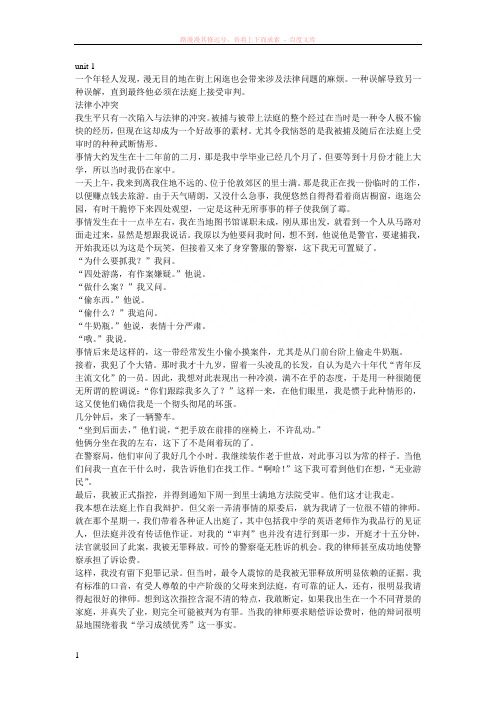
“为什么要抓我?”我问。
“四处游荡,有作案嫌疑。”他说。
“做什么案?”我又问。
学生们必须上网。你们家必须用数码与环球信息网联通。企业必须能即时下载大量资料。但是,除非我们改变范式、重新审视相关的各种因素,否则,信息高速公路就不会给我们带来什么结果。
无论是现在还是最近,我们都不缺乏信息。试想我们拥有的信息比四面年前的哥白尼多了多少。但他作出了足以震撼全球的(权作双关语)惊人之举,完全改变了人们对宇宙的看法。他作出此举不是靠发现更多的信息,而是靠用不同的眼光看大家都看到过的信息。爱德华·詹纳不是靠积累信息发明了预防药物,而是靠重新表述问题。
我本想在法庭上作自我辩护。但父亲一弄清事情的原委后,就为我请了一位很不错的律师。就在那个星期一,我们带着各种证人出庭了,其中包括我中学的英语老师作为我品行的见证人,但法庭并没有传话他作证。对我的“审判”也并没有进行到那一步,开庭才十五分钟,法官就驳回了此案,我被无罪释放。可怜的警察毫无胜诉的机会。我的律师甚至成功地使警察承担了诉讼费。
几分钟后,来了一辆警车。
“坐到后面去,”他们说,“把手放在前排的座椅上,不许乱动。”
他俩分坐在我的左右,这下了不是闹着玩的了。
在警察局,他们审问了我好几个小时。我继续装作老于世故,对此事习以为常的样子。当他们问我一直在干什么时,我告诉他们在找工作。“啊哈!”这下我可看到他们在想,“无业游民”。
最后,我被正式指控,并得到通知下周一到里士满地方法院受审。他们这才让我走。
大学英语精读(第三版)Unit-1-5讲稿

⼤学英语精读(第三版)Unit-1-5讲稿⼤学英语精读(第三版)Unit-1-5讲稿College EnglishIntensive ReadingBook OneUnit OneTeaching PlanI. Objectives and Requirements:1、Reading and Writing Course教学⽬标:1. To understand the true meaning of“language learning strategy” and talk about it;2. To read the text and try to evaluate andpractice the strategies introduced in the text;3. To write a paragraph stating how you planto develop your listening comprehesion and pay attention to the use of connectives;4. To learn some reading techniques and skills:how to read a text and predict the writer’s ideas.;5. To master the key phrases and some sentencepatterns.教学要求:1.要求学⽣掌握本单元的中⼼思想和⽂章结构,学会在写作中恰当使⽤关联词。
2.掌握新单词、句型的使⽤⽅法;加强相关听说训练。
3. 掌握阅读技巧:寻找关键词和句。
教学建议:1.在教学过程中启发学⽣开展关于“学习策略”的探讨,帮助学⽣树⽴和培养⾃主学习、⾃我探究的学习⽅式,掌握必要的学习策略,激发学习潜能。
2.提供最新的资料背景知识,如视频,新闻报道等。
2、Listening and Speaking CourseUnit 1: learn to listen for Names, introduceyourself or others in a conversation,understand and talk about college life.3、C omprehensive Exercises BookUnit 1: The students finish the exercises in their spare time.II. Teaching arrangement & Time Allotment1)Reading and Writing Course 6 periods2)Listening and Speaking Course 2 periods (every two weeks)III. Teaching MethodsCommunicative ApproachLearner-centered TeachingTask-based LearningTranslation MethodMultimedia ApproachIV. Presentation ProceduresLecture notesText: Some Strategies for Learning EnglishPart I. Background Information:1. Today’s English: Worldwide over 1.4 billion people live in countries where English has offical status. One out of five of the world’s population speaks some English. And at present one in five is learning English. With economic globalization and China’s opening up to the world, it has become increasingly important for the younger generation to master English. In a sense, English is not teachable, but learnable.2. Language learning strategies: They are used by learners to complete speaking, reading, vocabulary, listening or writing activities presented in language lessons. Recognizing that there is a task to complete or a problem to solve, language learners will use whatever strategies they possess to attend to the language-learning activity. Possible language learning strategies include: using practice opportunities, self-evaluation, selective attention, time management, reviewing notes taken in class and checking one’s understanding, constantly seeking answers to questions instead of passively receiving information, ect.3. Input-output balance theory in language learning: Input in language learning refers to information read, seen or heard by the learner, while output refers to what the learner produces in writing or speaking. The input-output balance theory in language learning believes that one can learn a language well through maintaining a balance between input and output.Part II. Warm-up Activities:Step 1. Ss Introduce themselves and talk about new college life.Step 2. Topic-centered Discussion(Group work)1.Do you enjoy learning English? Why or why not?2.What do you think is the most effective way of learning English?3.What is the greatest difficulty you have in your learning of English? Step 3. T makes a brief introduction to English learning and learning strategies. Part III. Text Analysis:Main Ideas: (Summary Writing)English as an international language is of vital importance for everybody to learn. Learning English is (绝⾮易事) by no means easy. Besides (持续的刻苦努⼒) sustained hard work, we need employ some learning strategies to (促进我们的学习) facilitate our learning.(我们应当以不同的⽅式对待⽣词) we should deal with new words in different ways. Active words demand constant practice while passive words only need to be recognized. As we try to understand the meaning of a word, we are also reminded of (它们的习惯⽤法) their idiomatic usage.Listening, speaking, reading and writing are the four basic skills that (我们不断努⼒试图获得的) we are constantly trying to acquire. In order to improve the four skills, we are suggested to listen to English every day, (抓住⼀切机会说英语) seize every opportunity to speak, read widely (难度适中的材料) materials at a proper level of difficulty and write regularly. Listening and reading (为我们提供语⾔输⼊) provide us with language input and we are expected to (实际运⽤我们所学的东西)put what we have learned into practice through speaking and writing. Structure:A strategy refers to a set of carefully planned methods for achieving something that is difficult and may take a long time.In introducing some strategies, the author adopts the structure of Problem—Strategy within a paragraph to show us the problems in English learning and then proposes strategies to solve the problems. Please scan the text for some examples of the Problem—Strategy structure.Problems Strategies1. It is impossible to memorize 1. Deal with ative vocabulary and passiveall the new words you are learning. vocabulary differently.2. You don’t know the idiomatic 2. Watch out for not only the meaning of ausage of some words. word but also the way it is used indailylife.3. You may not be able to catch a 3. Listen to it over and over again.lot after listening to a passagefor the first time.4. There are few situations for you 4. Seize every opportunity to speak Englishto practice speaking English at school. with or without a partner.Part IV. Learning points:1). Find out the active expressions:1. by no means not at all2. at fault responsible for something bad that has happened3. watch out for look out for; be on (one's) against4. seek out look for; try to find someone or something, especiallywhen this is difficult5. put…into practice carry out or performTranslate the following into English:1. 我对⽬前的表现⼀点也不满意。
大学英语精读第三册第一单元讲义

Unit 1 Book 3I. Words and Expressions1. notion: n. an idea, belief or concept*Our management system is based on the notions of personal equality and liberty. 我们的管理体系是基于人的平等、自由观念而建立的。
She has no notion of the difficulty of this problem.CF. idea, concept & notion这些名词均有“思想”、“观点”、观念”之意。
idea最普通,几乎适用于任何方面的思维活动。
concept指从众多实例中通过概括、归纳而形成的对事物本质、全貌及其内部联系的比较系统的概念或看法。
notion指的是一种模糊的、变化莫测的想法,无可靠的基础,是未经深思熟虑的、甚至让人觉得荒谬的观点。
(Directions:) Fill in the blanks with the words above. Change the form where necessary.(1) She seemed unfamiliar with the ______ that everyone should have an equal opportunity. (=concept)(2) I have no _____ how she managed to do this. (= idea/notion)(3) I had a silly _____ that he would come back and beg me for forgiveness. (=notion)(4) Don't get any _____ about revenge. (=ideas)2. criterion: n. standard by which sth. is judged*The company’s criterion for success is high sales.对一些出版商而言,评判一本书是否畅销的标准是长度而非内容。
大学英语精读第三版第三册Book3Unit1~Unit10翻译答案
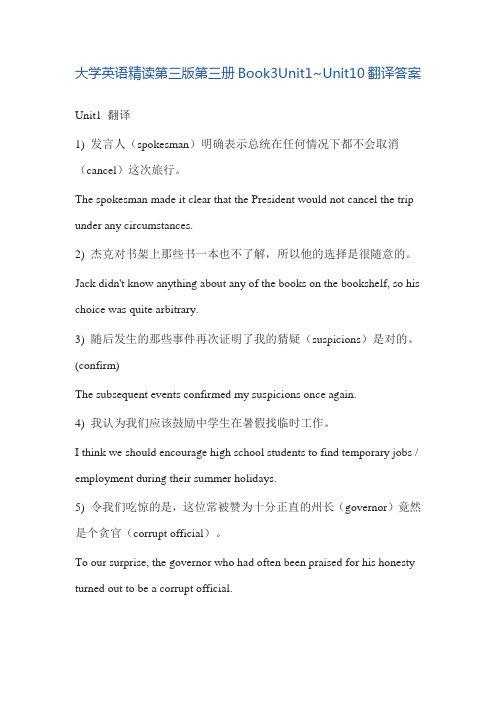
大学英语精读第三版第三册Book3Unit1~Unit10翻译答案Unit1 翻译1) 发言人(spokesman)明确表示总统在任何情况下都不会取消(cancel)这次旅行。
The spokesman made it clear that the President would not cancel the trip under any circumstances.2) 杰克对书架上那些书一本也不了解,所以他的选择是很随意的。
Jack didn't know anything about any of the books on the bookshelf, so his choice was quite arbitrary.3) 随后发生的那些事件再次证明了我的猜疑(suspicions)是对的。
(confirm)The subsequent events confirmed my suspicions once again.4) 我认为我们应该鼓励中学生在暑假找临时工作。
I think we should encourage high school students to find temporary jobs / employment during their summer holidays.5) 令我们吃惊的是,这位常被赞为十分正直的州长(governor)竟然是个贪官(corrupt official)。
To our surprise, the governor who had often been praised for his honesty turned out to be a corrupt official.6) 少数工人得到提升(be promoted),与此同时却有数百名工人被解雇。
A few workers were promoted, but meanwhile hundreds of workers were dismissed.7) 如果有机会,约翰也许已成为一位杰出的画家了。
现代大学英语精读1(第三版)教师用书Unit1
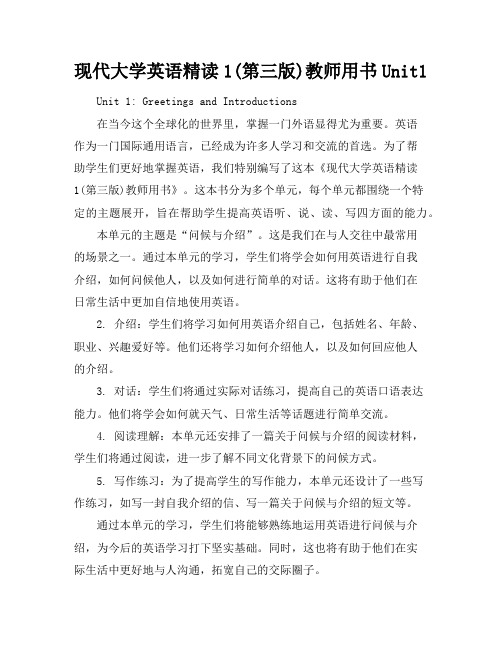
现代大学英语精读1(第三版)教师用书Unit1 Unit 1: Greetings and Introductions在当今这个全球化的世界里,掌握一门外语显得尤为重要。
英语作为一门国际通用语言,已经成为许多人学习和交流的首选。
为了帮助学生们更好地掌握英语,我们特别编写了这本《现代大学英语精读1(第三版)教师用书》。
这本书分为多个单元,每个单元都围绕一个特定的主题展开,旨在帮助学生提高英语听、说、读、写四方面的能力。
本单元的主题是“问候与介绍”。
这是我们在与人交往中最常用的场景之一。
通过本单元的学习,学生们将学会如何用英语进行自我介绍,如何问候他人,以及如何进行简单的对话。
这将有助于他们在日常生活中更加自信地使用英语。
2. 介绍:学生们将学习如何用英语介绍自己,包括姓名、年龄、职业、兴趣爱好等。
他们还将学习如何介绍他人,以及如何回应他人的介绍。
3. 对话:学生们将通过实际对话练习,提高自己的英语口语表达能力。
他们将学会如何就天气、日常生活等话题进行简单交流。
4. 阅读理解:本单元还安排了一篇关于问候与介绍的阅读材料,学生们将通过阅读,进一步了解不同文化背景下的问候方式。
5. 写作练习:为了提高学生的写作能力,本单元还设计了一些写作练习,如写一封自我介绍的信、写一篇关于问候与介绍的短文等。
通过本单元的学习,学生们将能够熟练地运用英语进行问候与介绍,为今后的英语学习打下坚实基础。
同时,这也将有助于他们在实际生活中更好地与人沟通,拓宽自己的交际圈子。
现代大学英语精读1(第三版)教师用书Unit1Unit 1: Greetings and Introductions在本单元的学习中,我们将探讨如何以自然、流畅的方式用英语进行问候与介绍。
通过一系列精心设计的活动和练习,学生们将逐步提高他们的英语交际能力。
我们将关注如何在不同场合下恰当地使用问候语。
例如,在正式场合,如商务会议或学术交流中,使用“Goodmorning/afternoon/evening”会更加得体;而在朋友聚会或休闲场合,简单的“Hi”或“Hello”就足够了。
大学英语精读第三版第一册Unit 1
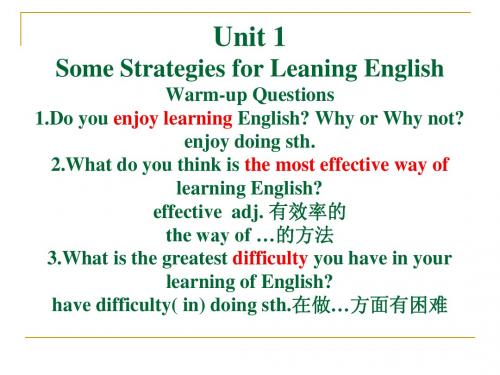
Para.5 1)listen to 听(强调动作) hear听见(强调结果) 2)basis n.基础 on basis of/ be based on以……为基础 3)in addition to除……之外 e.g. In addition to French, he has to study Japanese. 除了法语外,他还得学日语。 4)prepare for…为…做准备 make good preparation for 为…做好准备 5)a great deal许多,大量的(修饰不可数名词) 6)over and over again一次又一次
12)deal with处理 13)according to根据 14)occur v.发生---happen occur to是指“突然想到了什么”, e.g. It occurs to me that i have to go now. 我突然想到该走了。 happen to是指某件事发生在了某人身上 15)everyday adj.每日的(一般做定语) everyday work每天的工作 every day(做时间状语) work every day每天工作 16) practice n.实践 in practice 实际上 out of practice 不熟练 practice makes perfect 熟能生巧 17)commit to把…送交, 托付给… commit to memory记住
3)complain v.投诉,抱怨 complaint n. complain about sth.抱怨… e.g. I have to complain to the manager about it. 对这件事我不得不向经理申诉。 4)memory n.记忆---memorize v.记住 5)find it +adj. to do sth.发现做…是… 6)in fact事实上---as a matter of fact 7)at fault有错, 有责任 e.g. In my opinion both of the drivers were at fault. 在我看来, 两位司机都有责任。
大学英语精读第一册第三版课后部分翻译及完型答案

史密斯太太对我抱怨说,她经常发现与自己十六岁的女儿简直无法沟通。
Mrs. Smith complained to me that she often found it simply impossible to communicate with her 16-year-old daughter.我坚信,阅读简写的 (simplified) 英文小说是扩大我们词汇量的一种轻松愉快的方法。
I firmly believe that reading simplified English novels is an easy and enjoyable way of enlarging our vocabulary.我认为我们在保护环境不受污染 (pollution) 方面还做得不够。
I don’t think we’re doing enough to protect our environment from pollution.除了每周写作文外,我们的英语老师还给我们布置了八本书在暑假里阅读。
In addition to/Apart from writing compositions on a weekly basis, our English teacher assigned us eight books to read during the summer vacation.我们从可靠的消息来源获悉下学期一位以英语为母语的人将要教我们英语口语。
We’ve learned from reliable sources that a native English speaker is going to teach us spoken English next term/semester.经常看英语电影不仅会提高你的听力,而且还会帮助你培养说的技能。
Seeing English movies on a regular basis will not only improve your ear, but will also help you build your speaking skills.如果你们对这些学习策略有什么问题,请随便问我。
大学英语精读3课文(第三版)_中英文对照
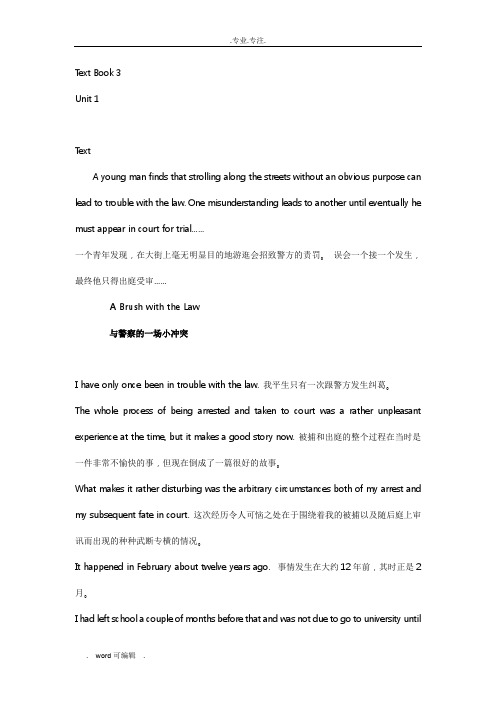
Text Book 3Unit 1TextA young man finds that strolling along the streets without an obvious purpose can lead to trouble with the law. One misunderstanding leads to another until eventually he must appear in court for trial……一个青年发现,在大街上毫无明显目的地游逛会招致警方的责罚。
误会一个接一个发生,最终他只得出庭受审……A Brush with the Law与警察的一场小冲突I have only once been in trouble with the law. 我平生只有一次跟警方发生纠葛。
The whole process of being arrested and taken to court was a rather unpleasant experience at the time, but it makes a good story now. 被捕和出庭的整个过程在当时是一件非常不愉快的事,但现在倒成了一篇很好的故事。
What makes it rather disturbing was the arbitrary circumstances both of my arrest and my subsequent fate in court. 这次经历令人可恼之处在于围绕着我的被捕以及随后庭上审讯而出现的种种武断专横的情况。
It happened in February about twelve years ago. 事情发生在大约12年前,其时正是2月。
I had left school a couple of months before that and was not due to go to university untilthe following October. 几个月前我中学毕业了,但上大学要等到10月。
大学英语精读三第三版课后答案及翻译

大学英语精读第三版(上海外语教育出版社 董亚芬主编)第三册Book3 Unit1答案1) accent2) turn against3) a couple of4) takes his time5) fate6) confirmed7) witness8) subsequent9) stands a chance10) trial1) belief2) brilliant3) employment4) has saved up5) stood a chance6) were awarded7) Presumably8) conducted9) casual10) around (which student life) revolves1) Joe wrote to say that he had to put off his visit because of his illness.2) Despite the noise, they went on working as if nothing were happening.3) Traffic was held up for several hours by the accident.4) Called (up) on to speak at the meeting, I couldn't very well refuse.5) Mrs. Stevenson looked in the cupboard and found there was not a single lump of sugar left.6) It was the rumor that turned Joe against his twin brother.7) We wondered how Sara was getting on in her new job.8) Although Anne agreed with me on most points, there was one on which she was unwilling to give in.9) Visitors could photograph almost anything here without having to ask for permission.10) Whether we make an excursion or stay home will depend on tomorrow's weather.1) uncertain,unafraid,unacceptable,unfamiliar,unequal;2) unanswered,unattached,unknown,undecided,unexpected;3) unhappily,unskillfully,unconsciously,unnecessarily,uncomfortably;4) unsay,undress,untie,unlock,unload。
外研社现代大学英语(第三版)精读3B3U1

外研社现代大学英语(第三版)精读3B3U1引言《外研社现代大学英语(第三版)精读3B3U1》是外研社出版的一本英语教材,适用于大学英语精读课程的教学。
本文档将介绍该教材的第三单元第一课的内容和教学目标。
教学目标本课的教学目标主要包括:1.学习如何描述人物的外貌和性格特点;2.掌握用英语询问和回答关于外貌和性格的问题;3.锻炼学生的听、说、读、写的综合能力;4.培养学生的团队合作和自主学习能力。
课程设计1. 课前准备在上课前,学生需要预习课本第三单元的课文,并熟悉生词和语法点。
教师可以提前准备好课件和教学素材,并检查学生是否按时完成了课前作业。
2. 导入新课教师可以通过呈现一张著名人物的照片,向学生展示人物的外貌特征,并引发学生对外貌和性格的讨论。
通过与学生的互动,激发学生的兴趣,引入新课。
3. 听力理解首先,教师播放课文的录音,并要求学生仔细听,并回答一些问题。
通过听力训练,学生可以更好地理解课文的内容和语言表达方式。
4. 阅读与理解学生在听力理解之后,阅读课文,并回答相关的问题。
同时,教师可以教授一些阅读技巧,帮助学生提高阅读理解的能力。
5. 语法讲解教师可以通过课文中的例句,讲解一些有关外貌和性格描述的语法知识。
例如,形容词的比较级和最高级的用法,特殊疑问句的构造等等。
6. 口语练习在口语练习环节,教师可以设计一些角色扮演活动,让学生练习用英语询问和回答关于外貌和性格的问题。
学生可以分成小组,互相面试,加强口语表达和听力理解的能力。
7. 作文训练最后,教师可以布置一篇关于自己或他人外貌和性格特点的作文。
学生可以在课后完成,并通过互相交流和修改,提高写作能力。
总结通过对《外研社现代大学英语(第三版)精读3B3U1》教材的介绍,我们可以看到该教材设计合理,既注重学生的兴趣和实际运用能力,又培养了学生的综合能力。
教师在教学过程中,应根据学生的实际情况,灵活运用各种教学方法和资源,帮助学生有效地学习和掌握英语精读的技巧和知识。
- 1、下载文档前请自行甄别文档内容的完整性,平台不提供额外的编辑、内容补充、找答案等附加服务。
- 2、"仅部分预览"的文档,不可在线预览部分如存在完整性等问题,可反馈申请退款(可完整预览的文档不适用该条件!)。
- 3、如文档侵犯您的权益,请联系客服反馈,我们会尽快为您处理(人工客服工作时间:9:00-18:30)。
Unit1Text II.Writing Skills1.Narration(primary purpose):experience of an interview2.Sequence:time.(It is written in the order which the events occurred)Application----Fear----Interview3.Description(not lengthy,does not carry much weight)The description contributes to the main purpose of narration,convincing the reader of the unpleasantness of his first job interview.It helps to make the narrative more vivid.①Journey:awkward/a long way from home/inconvenient transportation/hot②Surroundings:Outside the school building:dreary house/dust/fumes from a busy main roadInside the school building:smell of the cabbage/dingy/ink marks/crumbs on the carpet③Impression of the headmaster:unpleasant appearancenguage Points1.advertise1advertise(v.)vt.e.g.Do salesmen~their goods?Where do people~their products?They~their products in newspapers or on TV.vi.~fore.g.The family will~for a servant.People usually~for their lost properties in a newspaper or on a billboard②advertiser(n.)③advertisement(n.)=ade.g.The store has an~in the newspaper for a special sale.Have you ever received~s in your mailbox?mercial(n.)---an advertisement on television or radio(电视、广播之)广告2.in a suburb:a part of the suburbsin the suburbs:all or one of the outlying district of a citye.g.Is our university in the city or in the suburbs?Is Shipai a suburb of Guangzhou?He planned to build a house in the suburb of Shanghai.cf.outskirts(n.)(通常指郊外适合于散步的地方)---(esp.of a town)the outer areas(常用于in the outskirts片语)尤指城镇郊区;郊外---the outer limits(常用于on the outskirts片语中)边界e.g.We live in the suburbs.The children have been out for the day to some green spot on the outskirts.3.be short of:have not enough;lack;be in need ofbe short on:be poorer at,be not so good at在…稍差,在…较欠缺e.g.The book has good information,but rather short on illustration.She is a nice person,but short on looks.4.apply①apply(v.)a)request~to sb.for sth.e.g.If you want to go abroad,you may~to the Consul for a visa.He has applied to the banker for a loan.I will~to the boss for the position in person,not by letter.b)put into use or into position to serve its purpose应用~sth.to sth.e.g.He applies a sticking plaster to the cut.Do you~your knowledge to the practice?The teacher will~the rule to every student.~oneself/one’s energy/one’s mind to sth./doing sth.---concentrate one’s thoughts on a taske.g.We must~ourselves to our study.Paraphrase:He concentrates himself on learning French.If you try your best to do the job,you will soon finish it.②applicant(n.)③application(n.)make an~to sb.for sth.e.g.We made an~to the court for inquiry.The manager has received20~s for the position.5.degree①rank or grade given by a university to one who has passed an exame.g.Bachelor of Arts/Science(BA/BS)Master of Arts/Science(MA/MS)Doctor of Philosophy(PH.D)哲学博士Doctor of Science/Medicine/Law②to/in…degree等级,程度e.g..To what degree can he be trusted?He cannot be trusted in the slightest degree.nd1go,come,put on land;bring to lande.g.The plane~ed safely.The pilot~ed the airliner.2bring to reach a positione.g.He~ed himself in great difficulties.3get(informal)e.g.If I manage to~the job,I will stand you all a free drink.He~ed a valuable prize.7.chances of:(often plural with singular meaning)possibility;likelihood thatsth.will happene.g.You would have more chances of catching the train if you got a bus to the station instead ofwalking.Note:chances of doing sth.=hopes of doing sth.a chance of doing sth./to do sth.=the opportunity to do sth.8.slim(adj.)e.g.~hopes/chances of successa~excusea~girl:a slender girl9.summon:demand the presence of;call~sb to sth./~sb.to do sth.e.g.The manager~ed the shareholders to a general meeting.She~ed a servant.The teacher~ed me to the office.They~ed three women to appear as witness传唤证人cf.summons(n.)传票10.prove(proved,proved/proven)----to show(oneself or itself)afterwards,in the course of time or experience,etc.to be of the quality;turn out to bee.g.He proved(himself)to be a coward.As it happened,my advice proved to be wrong.On the long journey,he proved himself to be an amusing companion.The article has proved(to be)most useful.=The article is proved(to be)most useful./People proved the article most useful.He proved a real friend.It proved a waste.proof①proof(n.)I believe what you say;I don’t want any proof.②proof(adj.)be~againste.g.The tent material is~against water.a waterproof coat/a bulletproof car/a soundproof room/a shockproof watch11.as a result:in the ende.g.As a result,he was given a good jog.He broke his leg,as a result,he had to stop his studies.as a result of:because ofe.g.As a result of the war,other events occurred.He is unable to go to work as a result of the fall from his horse.He was late as a result of the snow.12.depress----to lessen the strength of;to sadden;discourage使不振作;使不景气e.g.Rainy weather always~es me.Her sad news~ed me all day.depressed作表语e.g.Since her baby died,she has been so depressed that she cries at the least thing.He recalled his last evening with his fiancée whenever he felt depressed.depressing作定语e.g.a depressing weathera depressing incident on my way to work13.survive①survive(v.)a)vi.---to continue to live,esp.after coming close to deathe.g.Of those wounded in the battle,only3~d.He is the only man who~d after the explosion.b)vt.---to continue to live after经过…活下来,幸存e.g.Only a few soldiers~d the battle.Only ten of the crew~d the shipwreck.Did anyone~the earthquake?vt.---live longer thane.g.The man~d his sister by3years.Insurance statistics show that most wives~their husbands.②survival(n.)a)[u]---survivinge.g.The~of even a few made people grateful to God.His~is still uncertain;he has been very badly hurt and may die.b)[c]---a person or sth.that remains or survivese.g.The old man is a~from my great-grand mother’s days.③survivor(n.)(of accidents)e.g.There were2~s of the air crash.This man was one of the~s from the earthquake.14.moustache:on the upper lipcf.beard:hair of lower part of the face(excluding moustache)15.a freckled forehead=a forehead with freckles onfreckle(v./n.)e.g.Some people freckle more easily than others.16.look at sb.with an air of…/do sth.with an air of…air:appearance;mannere.g.He speaks with an air of importance/success/surprise/sadness/excitement.17.to do one’s shoelaces=fasten one’s shoelaces18.smell(smelled/smelt)①vt. e.g.She smelled the meat to see if it was fresh.②vi. e.g.We smell with our nose.③link v. e.g.The dish smells good4vi.~of…有…的味道e.g.Your breath smells of brand.The air smelled of paint.19.go:to become(by a natural change,or by changing on purpose)(自然的或故意的)变成,使变成e.g.She is going grey./Her hair is going grey.The milk went sour.He has gone mad/blind.He went white with anger.20.proceed①proceed(vi.):go forward to前进~to sth.e.g.Please~to the next light,and then turn left.Let’s~to business.着手工作Don’t stop!Proceed please.~to do sth.=begin and continue to do sth.e.g.He~ed to tell me the matter.After drinking a cup of tea,mother~ed to cook the dinner.As soon as he came in,he~ed to tell us all his troubles.~with=go on withe.g.Let’s~with our workThe politician waited for the applause to die down and~ed with his speech.~from=result frome.g.The whole trouble~ed from a misunderstanding.~against=charge against控告②proceeding(n.)活动,进行情况e.g.He wrote an account of the~s of the meeting.21.GSC=GCE(General Certificate of Education)CSE=Certificate of Secondary Education.Both are public examinations standardized to give national comparability.GCE is usually intended for pupil of an academic basis,usually those who want to enter a university.22.vital(adj.)①connected with livingHe was wounded in a vital part.②supreme,very important23.attach①attach(v.)a)fasten or join one thing to another~sth.toe.g.I will~a label to my luggage.He~ed a document to the letter.There is a house with a garage~ed.There is a middle school~ed to our university.b)consider to have;connect with~importance/significance toe.g.Do you~much importance to what he said?The old man did not~much importance to the question.They~ed significance to his speech.be/become attached to变得喜欢,依恋,对…有感情e.g.She is~ed to her home.Are you~ed to this university?②attachment(n.)a)connectione.g.The~of a machine is easy.b)part attached附件e.g.A machine has many~s.c)attached feelingse.g.She has a great~to her sister.Do you have a great~to your mother?24.singular①singular(adj.)a)uncommon,strangee.g.Don’t make yourself so~in your dress.不要穿奇装异服b)outstanding非凡的e.g.He is a man of~courage.c)(gram.)of the form used in speaking or writing of one person or thing.②singularly adv.)a)particularly极b)strangely;in an unusual way奇异地③singularity(n.)a)strangeness[u]b)sth.unusual or sth.strange[c]25.consist of:be made up of(no passive) paraphrase:Our class is made up of28students.This book has18units.26.range from…to:vary between limitse.g.Prices for books range from10cents to100dollars.The age of the students ranges from22to25.range in…from…to…e.g.The books range in prices from10cents to100dollars.The students range in age from22to25.27.appal①appal(U.S.also appall)----fill with fear or terror,shock deeply惊吓,使惊吓~sb.e.g.The news appalled me.be appalled at/by…:be shocked bye.g.I was appalled at the news.②appalling(adj.)---terrible;cripple,bad蹩脚,糟糕e.g.The news was~.Mary is an~cook.③appallingly(adv.):terribly;verye.g.The figures of employment are~high.We got~hungry working so late.28.split(split,split,splitting)①(vt.)divide into partse.g.They~the money between themselves.Let’s~the cost of the dinner party.The robbers~the loot evenly.The family agreed to~the estate.He~(up)the book into5chapters.I will~up the class into groups.②(vt./vi.)break or cause to break,be brokene.g.When he bent over,he~his pants.The water pressure~the pipe.The lightening~the tree.Don’t~our organization.Some kinds of wood~easily.The board~as I sawed it.~on:give away the secret to one’s disadvantage告密~on sth./sb.to sb.向…告…的密e.g.The boy~on me to the teacher.Don’t~on him to his father.~one’s sides(with laughter):laugh with movements of the sidese.g.They~their sides at the joke.I~my sides at the story.a~second:a brief instant of timee.g.It happened in a~second.a splitting headache:so severe that it feels that one’head may crack29.incompetent:adj.not qualified or able不合格的,不胜任的be competent/incompetent at sth./doing sth.e.g.He is incompetent at his job.He is incompetent at working with his hands.be competent/incompetent to do sth.e.g.He is quite incompetent to be the leader.be competent/incompetent at sth.e.g.He is competent at all the subjects.be competent/incompetent for sth.称职/不称职e.g.He is competent for his job.be competent/incompetent as sth.e.g.He is competent as a teacher.incompetence(n.)e.g.He was dismissed for incompetence.30.constitute①constitute(v.)a)form/make up/be构成e.g.The best of3games~s a win.三盘两胜How many departments~our university?b)establish建立(制度/机构)e.g.We must~good traffic regulations.②constitution(n.)a)the way in which sth.is made upe.g.The~of a society is not simple.b)the body of laws and principles according to which a country is governed宪法e.g.According to American Constitution,presidential elections are held every4years.c)the general condition of a person’s body or mind身心状况(体质)e.g.The old man still has a strong~.John has a very healthy~.31.ultimate(adj.)①(not formal)greatest,after which no other can be considerede.g.Ultimate authority is exercised by the King.He has done stupid things before,but to look for the escaping gas with a match was the~ silliness.②last or farthest distance,being at the end or happening at the ende.g.Becoming president is his~goal.Their~victory is not in question.32.indignity(antonym:dignity)e.g.The indignity of having to say sorry to a woman is unbearable.the indignities of an illness:such as being washed and dressed by someone else33.diffidentthe antonym of diffident:confidentdiffidence(n.)34.the last straw/the straw that breaks the camel’s back---something in addition to a set of troubles which makes them at lasttoo much to bear经过一系列打击或不愉快的事又无法忍受的事e.g.The hotel was expensive,the food was poor and the bad weather was the last straw.He couldn’t get the job,being laughed at was the last straw.35.prospect(n.)①[u]reasonable hope of something happening;expectation.希望,展望,可能性e.g.There is not much~of my being able to see you before next month.There is no~of my success.②something that is expected前景,展望之物e.g.Our~s about the play are good.There is a~of a change in the weather.36.leisure①leisure(n.)可作定语“空闲的”e.g.~time/occupationsat leisurea)作表语,“有空”=be freee.g.I only meant that when you are at leisure,you might think the matter over.I am quite at leisure if you want me to do anything for you.b)作状语,“从容地,慢慢地”=without haste;leisurely(adv.)e.g.I put off writing to you till today that I might write at leisure.The doctor directed me to live more leisurely.We talked as we walked leisurely along.②leisurely(adj.)e.g.We had a leisurely meal.He did everything in a leisurely manner.Grammar:评论性的分词短语(comment participial phrase)A comment participial phrase is used in a sentence as a comment about the statement.In such a structure,the doer of the verb in the phrase is not identical with the subject of the sentence.This is how a comment participial phrase is different from one which acts as an adverbial in the sentence.e.g.Considering the amount she paid,the cat was dear in more ways than one.(If we consider the amount she paid,the cat was dear in more ways than one.)Judging from what you say,he has done his best.(If we judge from what you say,we can find that he has done his best.)There are only10apples here,not counting the bad ones.(If we don’t count the bad apples,there are only10apples here.)III.Questions on Text I1.What advertisement did the writer see in the newspaper?2.Why did he apply for the job?3.Was he confident that he would get the job?4.When did he receive a reply?5.What was the letter about?6.How was the journey to the school?7.Did the writer like the environment of the school?8.Did the writer like the headmaster?9.Was the headmaster’s appearance pleasant?What did he look like?10.Did the headmaster show his hospitality to the writer?What was the headmaster’s attitudetowards the writer when he saw him?11.Where did the headmaster interview the writer?12.Was the room pleasant?13.What questions did the headmaster ask the writer?14.Did the writer think games were very important in children’s education?How about theheadmaster?15.Did the writer think he had much in common with the headmaster?16.Did the writer get the job?How do you know?17.Was there a playground in the school?Where do the children play?18.Did the writer like the teaching set-up?Why?19.How much was the salary that the headmaster offered to the writer?20.What was the worst thing of the job?Why?IV.Translation(You had better do this part before checking the reference version attached.)1.要一个人专心致力于一份枯燥无味的工作是很艰难的。
